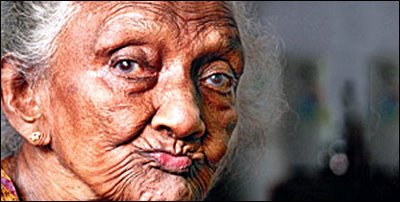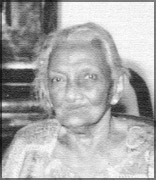
Sri Lanka Genealogy Website - Sinhalese Family Genealogy
Gunawardena, Don Jacolis Rupasinghe (Boralugoda Appuhamy/Ralahamy - The Lion of Boralugoda) 1879-1947 - Family #3069
1 Gunawardena, Don Jacolis Rupasinghe, b:10-Sep-1879, d:8-Oct-1947, incarcerated and sentenced to death (later reprieved by the Governor) by the British Raj for alleged involvement in the anti Muslim riots of 1915 + Don Liyanora (Gunasekera Hamine of Siyana Korale)
...2 Harry Gunawardena
...2 Don Philip Rupasinghe Gunawardena b:11-Jan-1901, d:25-Mar-1972 founders of the Lanka Sama Samaja Party (LSSP) + Kusuma Siri Amarasinghe, b:26-May-1912, d:30-May-1985 (d/o Don David Amarasinghe & Sophinona), m:30-Jun-1939
......3 Indika Gunawardena
......3 Prasanna Gunawardena
......3 Dinesh Gunawardena
......3 Geethanjana Gunawardena
......3 Lakmali Gunawardena
...2 Don Benjamin
(Robert) Rupasinghe
Gunawardena, b:12-Mar-1904, d:Dec-1971 of Kodgama, one of the
pioneer founders of the Lanka Sama Samaja Party (LSSP),
Ambassador to China 1965-70 + Seelakalyana Rupa Kottegoda of
Badulla (niece of Dr MVP Pieris)
...2 Sophia Gunawardena + PE Kulasekera
...2 Emily Angeline Gunawardena + Dr Don Allenson Goonetilleke
......3 Violet Vivienne Goonetilleke, b:16-Sep-1916 in Colombo and resided at Tissamaharama where her father was stationed at that time. Boarded at Musaeus College, Colombo, Head Girl in 1933, MMC & MP LSSP + Leslie Goonawardena, s/o Dr Andrew Simon Goonewardena of Panadura, m:1939
.........4 Kumudini Goonawardena, b:Oct 1940
.........4 Premilla Goonewardena
......3 Danny Goonetilleke
......3 Dr. Rajah Goonetilleke
......3 Tulin Goonetilleke
......3 Lakshmie Goonetilleke
...2 Alice Gunawardena + DC Umagiliya
...2 Caroline Gunawardena (Caro) b:Oct 8, 1908, d:July 6 2009 born in Avissawela + Anthony Pillai (Tony)
Caroline Anthony Pillai:
On July 6, 2009, Caroline Anthony Pillai, the last living link to the early socialist movement in Sri Lanka passed away at the age of 102. She was a pioneer in many ways. Drawn into politics by her fiery elder brothers, Philip and Robert Gunawardena, she participated in the nascent Ceylonese Nationalist Movement of the early 30s and helped launched the Lanka Sama Samaja Party (LSSP) in 1935.
 |
|
Caroline Anthony Pillai |
Dona Caroline Rupasinghe Gunawardena was born on October 8, 1908, in rural Boralugoda in the Avissawella District. Her father, Don Jakolis Rupasinghe Gunawardena, was a prosperous landowner who served the British colonial government as the village ralahamy (headman) and vidane arachchi (local police officer). The local folk deferentially called him “Boralugoda Ralahamy.”
In 1915 commercial rivalry between Sinhalese Buddhist and Muslim merchants flared into communal violence. The British Governor imposed martial law and rounded up suspected nationalists, including Caroline’s father, who was accused of giving dynamite to rioters, sentenced to death and jailed for seven months until he was released for lack of evidence.
The ordeal turned the Gunawardenas into resolute nationalists. Boralugoda Ralahamy pulled his sons out of the Prince of Wales College and put them in Ananda, the Theosophist-Buddhist school for boys. Caroline and her sisters were sent to Musaeus College, the sister school for girls. After passing out of Musaeus, Caroline returned to Boralugoda and started teaching at the Siddhartha Vidyalaya.
In the late ‘twenties Caroline and her brothers, Harry and Robert, became active in nationalist youth groups which were demanding democratic reforms with the ultimate goal of complete independence.
When the British announced that a State Council would be convened in 1931, Harry Gunawardena decided to contest the Avissawella constituency. Caroline campaigned for her brother. Though Harry lost, Caroline found her calling. From that point on, she dedicated her life to winning freedom for Ceylon and India and social justice for all.
In late 1932 her brother Philip returned to Ceylon after a ten-year sojourn in the USA and England, where he had been an active member of the British Communist Party until he was expelled for supporting Trotsky against Stalin. Upon this return home, he converted Caroline and Robert to his revolutionary ideology. This was the nucleus of the revolutionary movement in Ceylon.
Caroline participated in the annual Suriya Mal campaigns, which were a form of protest against the official observation of Remembrance Day.
When an epidemic of malaria broke out in 1933-34, the Suriya Mal activists fanned out into the stricken villages to dispense food and medicine. Caroline played an important role. The Gunawardena’s set up a dispensary in their house in Boralugoda. Caroline worked closely with her classmate from Musaeus, Selina Perera (Peiris), who joined the group around the Gunawardenas.
In 1935 Caroline joined the LSSP that boldly called for an “equal society” (sama samaja) cleansed of all racial, caste, class and gender discrimination.
Caroline became a respected party leader in her own right. In 1937 the party selected Caroline to be part of the LSSP delegation to the Faizpur session of the Indian National Congress. Caroline was a role model to the younger women in the party, especially Vivienne Goonetilleke and Kusumasiri Amarasinghe, who later married Leslie Goonewardene and Philip Gunawardena, respectively.
In 1937-38 a number of talented Tamil youth joined the LSSP, including S.C.C. Anthony Pillai, who went by the nickname “Tony”.
In 1939 Caroline and Tony married in a simple ceremony.
The Second World War had just started in Europe. Following the Trotskyist line, the LSSP vociferously opposed the “imperialist war”. Unwilling to tolerate the Trotskist troublemakers any longer, the colonial government arrested four LSSP leaders, including the two State Councillors, seized the party press and banned party activities. Despite the tightening vice of repression, Tony and Caroline pressed ahead with their work. In 1940-41 they led strikes by bus workers, harbour workers and granary workers.
In April, 1942 the LSSP underground workers carried out a perfectly planned rescue of their leaders from jail. The jailbreak brought renewed repression. Meanwhile, in India, Gandhi was threatening to summon a mass movement to force the British to “quit India”.
The LSSP had already helped to organize a skeletal Trotskyist organization there - the Bolshevik Leninist Party of India (BLPI). Unable to do much in Ceylon, the LSSP leaders decided to escape to India and help their BLPI comrades intervene in the impending mass struggle. In July, 1942 about to dozen Ceylonese Trotskyists secretly crossed over to India in fishing boats. While most headed for Bombay, Tony went to Madurai.
An anxious Caroline stayed behind with the two children. A month later the Quit India Movement erupted. The BLPI, new to the scene, threw its meager resources into the fight. In Madurai, Tony and the handful of local BLPI members printed leaflets in support of the movement.
After the Quit India Movement subsided, Tony sent a message to Caroline asking her to join him in Madras. The family was at last reunited.
In July 1943, the police raided the BLPI hideout in Bombay where Philip and Kusuma Gunawardena and another half dozen young comrades were staying. The other Ceylonese fugitives in Bombay escaped and fled to Madras, where they took refuge with Caroline and Tony in a large, two-storied house in Venus Colony in Teynampet. With the police hot on their trail, Caroline and Tony decided that it was best for her to take the children back to Ceylon.
After his releaze from Alipuram, Tony returned home to Ceylon. But he and Caroline had little time to settle back into the political life of their country.
The BLPI in Madras sent word that their work in the Buckingham and Carnatic Mills during the war had paid off. The president of the Madras Labour Union, the oldest and largest union in India, representing the mill workers, was willing to pass the mantle of leadership to Tony. That was an opportunity that couldn’t be declined. And so Tony, Caroline and the children went back to Madras.
On June 6, 1946 Tony was elected president of the Madras Labour Union. The very next day an incident in the mills precipitated a strike. Caroline and her BLPI comrades plunged into strike support activities. After 48 days the union won its key demands. In early 1947 the situation in the B&C Mills heated up again.
The union leaders started collecting strike funds, organized a network of neighbourhood committees and recruited 1,000 volunteers to form a workers defense guard. Anticipating that Tony would be arrested once the strike began, the union formed a secret strike committee in which Caroline was to play a leading role.
Before dawn on March 10 the police arrested Tony. The secret committee called a mass meeting that evening. At the meeting, according to one eyewitness, “Mrs. Caroline Anthony Pillai’s speech at the height of her emotions infused in the workers a new sense of dutifulness and her speech showed them a new path”. (K. Appanraj, Anja Nenjan: Thoyizh Sangha Medai S.C.C. Antoni Pillai Vazhkai Varalaru, Chennai, 1995) She said there would be no negotiations until Tony and the other leaders were released.
The next day not a single one of the more than 14,000 workers entered the B&C Mills. Afraid that the workers would march to the jail where Tony was held, the Government transferred him to a remote jail in Andhra, where he was placed in solitary confinement.
On March 28 more than 40,000 strikers and their families turned out for a union rally. Caroline, the main speaker, called for a one-day hartal in Madras in support of the strike. More than 100,000 honoured the hartal. The mood was militant. Workers erected road blocks. The Government deployed troops in a massive show of force.
One night, when Caroline and Selina Perera set out for a clandestine meeting of the strike committee in Perambur, they noticed two men following them to the bus stop. Certain that they were CID men, Caroline came up with a plan. When the bus arrived, Caroline told the driver that two men were pursuing them with evil intentions. Caroline stood at the front door of the bus, Selina at the back. As the two policemen tried to board, they kicked them as hard as they could and the bus sped away.
The next morning, the Malabar Special Police came to Caroline’s place and put her under house arrest. That didn’t deter Caroline. She wrote notes, pinned them to the inside of her eldest son’s trousers, and sent him to rendezvous with the union leaders in Perambur. When the Government banned all rallies and demonstrations, Caroline and her comrades devised other ingenious tactics. On one occasion, about 500 strikers infiltrated into the central railway station in little groups and then closed ranks and marched out in a procession shouting slogans, taking the police by surprise.
On June 9 the Government illegalised the union, seized its funds, locked its headquarters and arrested 49 BLPI members. The Madras Labour Union had no choice but to end the strike. Even then nearly 3,000 workers stayed away from the mills in protest.
Though the strike was defeated, Caroline and Tony had earned the admiration and support of the working class in Madras. In 1947 Tony was elected president of the Madras Port Trust Employees’ Union and the following year he and two other Trotskyist officers of the Madras Labour Union were elected to the Madras Municipal Council.
Caroline Anthony Pillai was a link to a bygone era in politics. She forsook a comfortable future to fight for the freedom of her country and the uplift of the working classes. She dedicated her life to the revolutionary vanguard. She never flinched in the face of danger and adversity. She inspired and mentored others. She loathed lies and hypocrisy.
Let us honour Caroline Anthony Pillai - the fearless little girl who ran under elephants and became “the lioness of Boralugoda”.
The writer is the author of Tomorrow is Ours: The Trotskyist Movement in India and Ceylon, 1935-48, published by the Social Scientists Association. Email: wes-ervin@bellsouth.net